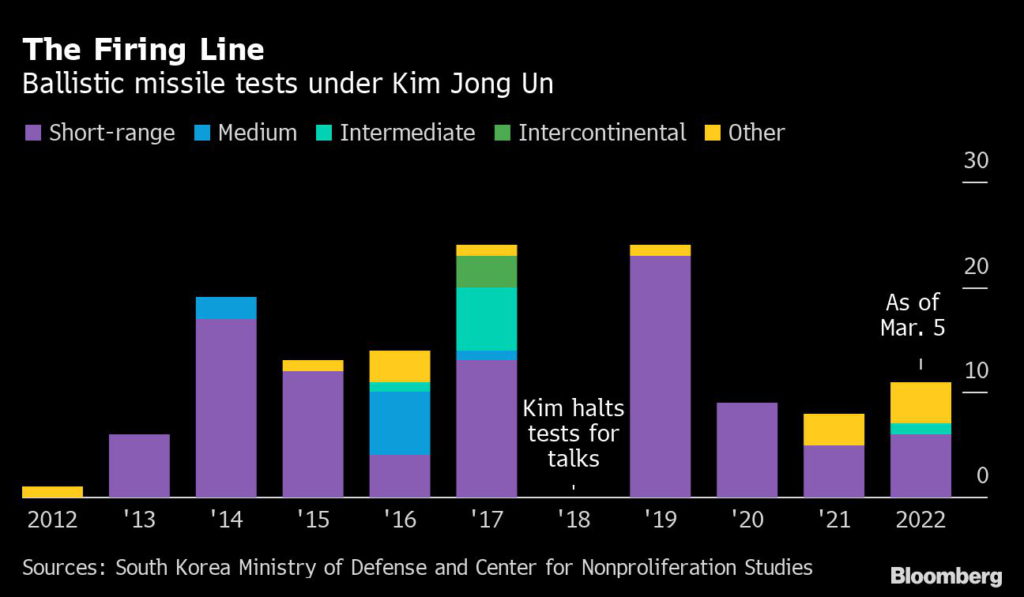(Bloomberg) — North Korea fired a suspected ballistic missile Saturday, ramping up tensions just days before South Korea holds a presidential election and as global attention is diverted toward Russia’s invasion of Ukraine.
North Korea fired what appeared to be a ballistic missile from an area near Pyongyang’s international airport at 8:48 a.m.
toward the sea off the country’s eastern coast, according to South Korea’s Joint Chief of Staff. The projectile flew about 270 kilometers (168 miles) and reached an altitude of around 560 km, the JSC said in a later statement.
Japanese Defense Minister Nobuo Kishi said the launch was of a suspected ballistic missile that reached an altitude of about 550 km and traveled a range of about 300 km before landing outside of his country’s exclusive economic zone.
The flight trajectory and launch site are similar to North Korea’s last test on Feb.
27, when Pyongyang said it fired off a rocket in a test of a reconnaissance satellite. While the country has long said it’s entitled under international law to have a civilian space program, the U.S.
and others have accused it of using satellites as a cover to bolster its ballistic missiles for the military.
North Korea typically doesn’t comment on its tests until about a day after the fact.
Kishi repeated Japan’s protest against launches that violate United Nations resolutions barring North Korea from ballistic missile tests.
The US-Indo Pacific Command and the South’s presidential office “condemned” the latest launch, urging Pyongyang to refrain from making additional provocations.
North Korea often uses its provocations for political purposes.
The latest launch comes days before South Koreans go to the polls on March 9 to elect a new leader to replace President Moon Jae-in and as the Biden administration is tied up with one of its greatest international challenges — the Russian invasion of Ukraine.
“Any crisis or major event will present an opportunity for North Korea to insert its relevance to the parties,” said Soo Kim, a policy analyst with the Rand Corp.
who previously worked at the Central Intelligence Agency.
“There’s essentially not enough time or policy space for the Moon administration to take any response measures, which means that Kim can again go scot-free with his missile tests and no consequences,” she said.
North Korea had halted testing while its neighbor and biggest benefactor China hosted the Beijing Winter Olympics.
The latest launch came shortly before China’s parliament opened its annual session in Beijing, the first time in five years that Kim Jong Un has fired a rocket during the event.
In January, North Korea fired off its biggest monthly series of tests during Kim’s decade in power.
The barrage culminated in the Jan. 30 launch of an intermediate-range Hwasong-12 ballistic missile that reached an altitude of 2,000 kilometers (1,240 miles).
The Hwasong-12 launch effectively ended a halt to long-range missile tests put in place before Kim’s first summit in 2018 with former U.S.
President Donald Trump. Nuclear disarmament discussions broke down after Trump halted a summit with Kim in 2019 and the North Korean leader has so far shown no interest in calls from the Biden administration to get back to the table.
China and Russia, which have veto power at the United Nations Security Council, have called for winding back some of the sanctions already imposed on Pyongyang and may not have much appetite to tighten economic penalties now in response to North Korea’s latest launch.
Kim has displayed little enthusiasm for the Biden administration’s call for him to return to nuclear disarmament talks, which have stalled for about three years.
So far the U.S. hasn’t budged on North Korea’s demands that it ease up on sanctions choking the Asian nation’s economy.
In recent months Kim’s regime has tested missiles designed to hit South Korea and Japan, which host the bulk of U.S.
troops in the region. These include hypersonic systems designed to use high speeds and maneuverability to evade U.S.-operated interceptors. The intermediate-range missile fired in January could hit Guam, where American troops are stationed.
North Korea’s main objective appears to be “staying relevant” amid the South’s presidential election and the Ukraine crisis, said Yang Moo-jin, a professor at the University of North Korean Studies in Seoul who has advised the South Korean government.
(Updates with details on launch from second and third paragraph, adds analyst comments)
More stories like this are available on bloomberg.com
©2022 Bloomberg L.P.











